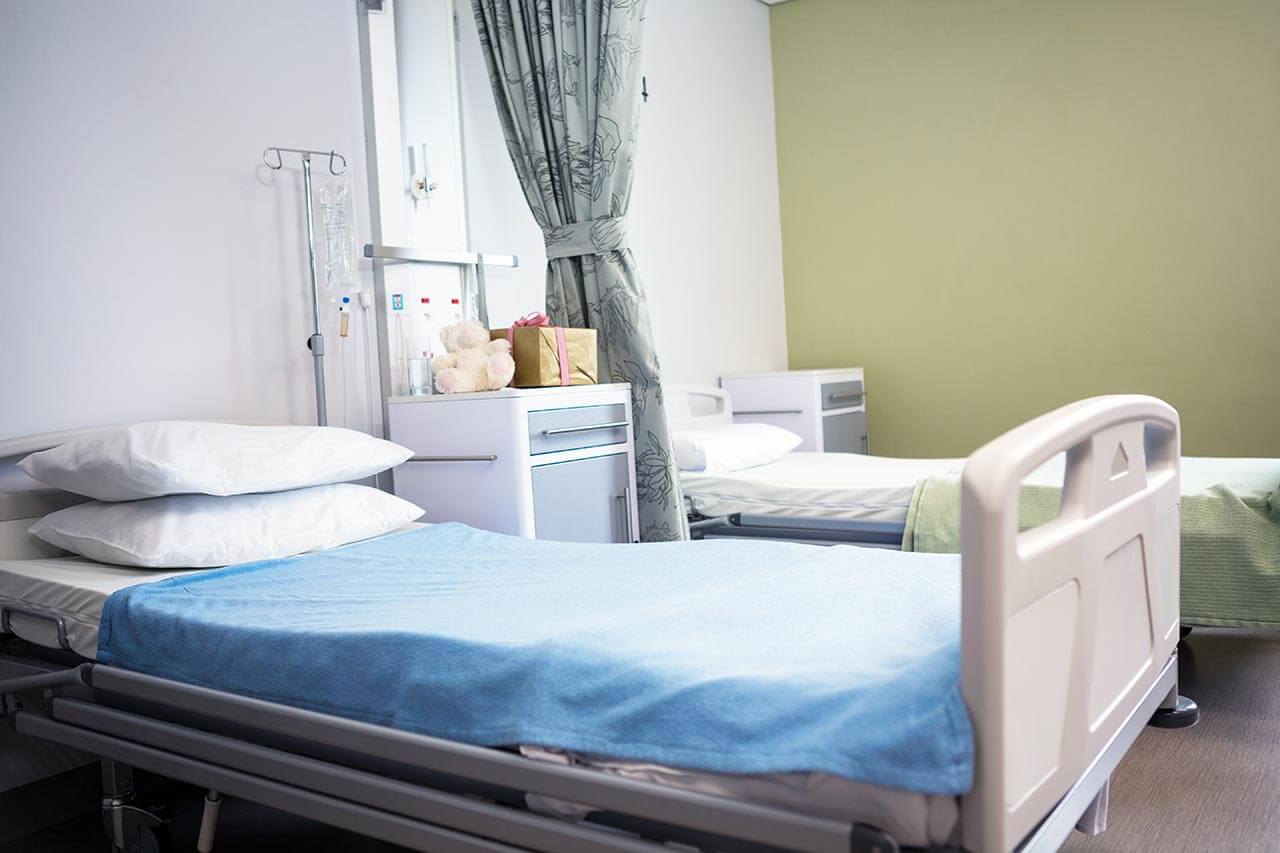
The program includes:
- Initial presentation in the clinic
- clinical history taking
- review of medical records
- physical examination
- laboratory tests:
- complete blood count
- biochemical blood test
- inflammation markers (CRP, ESR)
- blood coagulation analysis (aPTT, PT, INR)
- ultrasound of the abdomen
- gastroscopy with H.pylori test, biopsy
- nursing services
- consultation of related specialists
- treatment by chief physician and all leading experts
- explanation of individual treatment plan
Required documents
- Medical records
- Esophagogastroduodenoscopy (EGD) (if available)
Service
You may also book:
 BookingHealth Price from:
BookingHealth Price from:
About the department
The Department of Pediatric and Adolescent Medicine at the Children's Hospital Amsterdamer Cologne offers comprehensive medical services and care for children and adolescents of all age groups with acute and chronic diseases. The department's range of medical services also includes the treatment of extremely premature babies at the Level I Perinatal Center. The health of young patients is in the safe hands of a multidisciplinary team of doctors specializing in the treatment of allergies, diabetes mellitus, endocrine diseases, gastrointestinal pathologies, epilepsy, heart disease, infectious diseases, lung diseases, rheumatic conditions, and malignant tumors. The highly qualified team of 50 healthcare professionals takes care of the health and well-being of young patients. Pediatricians cooperate closely with pediatric surgeons. The specialists jointly study complex clinical cases, striving to provide the most effective treatment for the child. Clinical practice is carried out in strict accordance with the current diagnostic and treatment protocols. The modern infrastructure and play areas in the department allow children to feel as comfortable as possible. In addition, doctors have vast experience communicating with young patients and quickly establishing friendly relationships. The department is headed by Prof. Dr. med. Michael Weiss.
Of particular interest to the department's specialists is the treatment of cancer and diseases of the hematopoietic system. They cooperate with pediatric surgeons to provide medical care for young patients with leukemias, lymphomas, brain tumors, nephroblastomas, osteosarcomas, Ewing sarcomas, and soft tissue sarcomas. The department's oncologists also provide medical care to children with rare malignant tumors. The medical facility offers all treatment methods for malignant diseases in children, such as chemotherapy, radiation therapy, surgery, immunotherapy, targeted therapy, etc. The department actively cooperates with the University of Duesseldorf in the field of bone marrow transplant. A treatment regimen for each child is developed, taking into account the requirements of the German Society for Pediatric Oncology and Hematology (GPOH).
The primary tasks in the department's clinical practice are the diagnosis and treatment of cardiovascular diseases in children. Pediatric cardiologists perform all types of non-invasive diagnostics and treat congenital and acquired heart diseases and circulatory system pathologies in children and adolescents. Diagnostic options include standard ECG, long-term ECG monitoring, ergometry / spiroergometry (stress tests), phonocardiography, transthoracic echocardiography (M-mode, 2D, and Doppler examinations), transesophageal echocardiography, 24-hour blood pressure monitoring, and other examinations. In cooperation with the specialists from the Perinatal Center at the Hospital Cologne-Holweide, fetal heart examinations are carried out, and, if necessary, the optimal treatment tactics for congenital heart defects are planned. The department's pediatric cardiologists are responsible for conservative treatment. The partner Heart Centers performs catheter-based interventional procedures whenever required. Intensive therapy can also be provided for children with heart conditions.
The department is famous for its success rates in the treatment of diabetes mellitus in children. After the establishment of an accurate diagnosis, the department's doctors select an individual regimen of hypoglycemic medications. The therapeutic measures are aimed at normalizing blood glucose levels, preventing complications of diabetes mellitus, ensuring normal physical and mental development of the child, promoting social, school, and professional integration of children with diabetes mellitus, etc.
Another important area of work for the department's pediatricians is the treatment of gastrointestinal diseases in children. Gastroenterologists focus on young patients with celiac disease, chronic inflammatory disease (Crohn's disease and ulcerative colitis), chronic constipation, hepatitis, gastrointestinal bleeding, and ulcers. Doctors use personalized drug therapy regimens to help children with gastrointestinal conditions and perform therapeutic endoscopic procedures, including gastroscopy and colonoscopy, if required. The specialists also use dietary therapy in their work.
The medical facility successfully treats diseases of the nervous system, the most common of which are epilepsy, cerebral palsy, multiple sclerosis, myopathies, and chronic headaches. The department houses a specialized section with an integrated Social Pediatric Center that admits young patients with neurological disorders. An interdisciplinary team of physicians consisting of neurologists, psychologists, physiotherapists, speech therapists, specialists in music therapy, and art therapists works with children. The key focus in clinical practice is on providing medical care to children with epilepsy. The specialists combine treatment with anticonvulsants and a special diet. Of particular interest to pediatric neurologists is the treatment of developmental and motor disorders.
The department's main clinical activities include:
- Diagnostics and treatment of cancer and hematopoietic diseases
- Leukemias: acute lymphocytic leukemia, acute myeloid leukemia, and chronic myelogenous leukemia
- Brain tumors: medulloblastomas, astrocytomas, glioblastomas, ependymomas, and craniopharyngiomas
- Retinoblastomas
- Lymphomas: Hodgkin's lymphomas and anaplastic large cell lymphomas
- Nephroblastomas
- Renal cell carcinoma
- Hepatoblastomas
- Hepatocellular carcinoma
- Germ cell tumors: chorionepitheliomas, yolk sac tumors, granulosa cell tumors, and teratomas
- Osteosarcomas
- Ewing sarcomas
- Soft tissue sarcomas: rhabdomyosarcomas, undifferentiated sarcomas, and neuromas
- Langerhans cell histiocytosis
- Angiomas
- Diagnostics and treatment of cardiovascular diseases
- Congenital and acquired heart defects
- Diagnostics and treatment of diabetes mellitus
- Long-term follow-up monitoring of children and adolescents with all types of diabetes mellitus in accordance with the recommendations of the Pediatric Diabetology Working Group
- Modern therapies, including intensive insulin therapy, insulin analogue therapy, and insulin pump therapy
- Early diagnostics and treatment of comorbidities and complications of diabetes mellitus
- Age-appropriate training for children and their parents on how to live with diabetes mellitus
- Personalized psychological care
- Diagnostics and treatment of endocrine diseases
- Short stature
- Gigantism
- Precocious puberty or delayed puberty
- Thyroid diseases
- Obesity
- Adrenal diseases
- Pituitary diseases
- Disorders of sexual differentiation
- Diagnostics and treatment of gastrointestinal diseases
- Calculous cholecystitis
- Hepatitis
- Chronic diarrhea
- Celiac disease
- Crohn's disease
- Ulcerative colitis
- Chronic abdominal pain
- Chronic constipation
- Gastrointestinal bleeding
- Lactose intolerance
- Gastroesophageal reflux disease
- Gastritis
- Peptic ulcer
- Diagnostics and treatment of neurological diseases
- Epilepsy
- Cerebral palsy and other movement disorders
- Neuromuscular diseases
- Neurometabolic diseases
- Inflammatory diseases of the nervous system
- Chronic headaches
- Diagnostics and treatment of allergies
- Bronchial asthma with a predominance of an allergic component
- Neurodermatitis
- Allergic rhinitis
- Hives
- Food allergy
- Insect venom allergy
- Drug allergy
- Diagnostics and treatment of other chronic diseases
- Obesity
- Neurodermatitis
- Chronic pain syndromes
- Diagnostics and treatment of kidney diseases
- Nephrotic syndrome
- Inflammatory kidney lesions: glomerulonephritis and pyelonephritis
- Urinary incontinence
- Bladder dysfunction (for example, neurogenic bladder)
- Diagnostics and treatment of rheumatic diseases
- All forms of rheumatoid arthritis
- Systemic joint lesions
- Diagnostics and treatment of respiratory diseases
- Bronchial asthma
- Chronic obstructive bronchitis
- Cystic fibrosis
- Tuberculosis
- Interstitial lung disease
- Congenital lung and bronchial malformations
- Primary ciliary dyskinesia
- Bronchiectasis
- Bronchopulmonary dysplasia
- Functional respiratory disorders
- Intensive care for premature infants and young children with congenital urologic, cardiologic, and other diseases
- Other medical services
Curriculum vitae
Prof. Dr. med. Michael Weiss graduated from the Universities of Frankfurt and Munich. He underwent specialized training in Pediatric and Adolescent Medicine at the Dr. von Hauner Children's Hospital (Academic Hospital of Ludwig Maximilian University of Munich). In 1993, the doctor was board certified in Pediatric and Adolescent Medicine. In 1995, he was appointed as Senior Physician, and on April 1, 2000, he was appointed as Head Physician in the Department of Pediatric and Adolescent Medicine at the Children's Hospital Amsterdamer Cologne.
One of the most important focuses for Prof. Weiss is Infectology. In 1994, the doctor received a diploma from the German Society for Pediatric Infectiology and had his habilitation at Ludwig Maximilian University of Munich (subject: "Cytokines and cytokine receptors", 1997). In 2012, he obtained additional qualifications in Infectology.
Prof. Weiss is an Honorary Member of the German Society of Pediatric Surgery. In addition, from 2007 to 2016, he worked as Treasurer and Executive Board Member of the German Society of Pediatric and Adolescent Medicine.
Photo of the doctor: (c) Kliniken der Stadt Köln gGmbH
About hospital
The Children's Hospital Amsterdamer Cologne has the status of one of the largest and most respected pediatric medical centers in Germany. The medical facility is the Academic Hospital of the University of Cologne, with a long history of more than 55 years. The hospital employs competent specialists in various fields of pediatric medicine who apply their experience and knowledge for the treatment of young patients with various pathologies, ranging from bronchial asthma, diabetes mellitus, epilepsy, and malformations to cancer and mental disorders. The most important areas of specialization are pediatric surgery and urology.
The medical team of the hospital treats over 10,000 inpatients every year. It performs more than 5,000 surgical interventions on children annually. In addition, the emergency medical service provides its services to about 35,000 patients annually. The medical facility has 292 beds for inpatient treatment.
The hospital cooperates closely with maternity hospitals in the city of Cologne, as well as with the University Hospital of Cologne and other children's hospitals. The hospital offers all modern facilities and medical and technical equipment for the accurate diagnosis and high-quality treatment of children of various age groups, from extremely premature infants to adolescents and teenagers. The involvement of parents in the therapeutic process plays a significant role in the treatment of young children.
The work of the hospital is recognized by prestigious quality certificates, particularly the Ausgezeichnet. FÜR KINDER certificate. This certification was given to the Department of Pediatric and Adolescent Medicine as well as to the Department of Pediatric Surgery and Urology. This certificate is one of the top awards given to medical centers for excellent inpatient medical care in Germany, so parents can be sure that the health of their children is in the safe hands of true professionals.
Photo: (c) depositphotos
Accommodation in hospital
Patients rooms
The young patients of the Children's Hospital Amsterdamer Cologne live in comfortable and cozy rooms. The standard room furnishings include an automatically adjustable bed, a bedside table with a pull-out tray, a TV, a wardrobe, a table, and chairs. Each patient room has an ensuite bathroom with a shower and a toilet.
One of the parents may stay in the patient room with their child. The hospital also offers accommodations for parents. Parents from other cities or countries have the opportunity to stay at the Ronald McDonalds Haus Hotel.
Meals and Menus
The young patients are offered a daily choice of three menus. If, for some reason, a child does not eat all the foods, they will be offered an individual menu. Please inform the medical staff about the preferences of your child prior to treatment.
The parents can eat in the cafeteria after receiving meal vouchers from the hospital administration. During inpatient treatment, they are also offered drinks, such as tea and coffee.
Further details
Standard rooms include:




